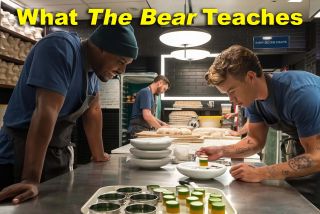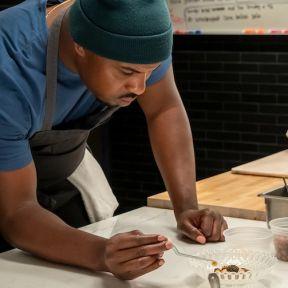KEY POINTS-
- The best part of the show comes when they key players depart on journeys of personal growth.
- More than anything, the show is about the blessing, and curse, of having a calling in life.
- It doesn’t matter what your passion is, what matters is that you do it with all your heart and soul.

The Bear is about an award-winning chef (played by Jeremy Allen White from Shameless) who returns to his hometown, Chicago, to run his late brother’s struggling but beloved restaurant. The show is about turning a greasy spoon into a world-class fine dining establishment, and everything that can go wrong along the way. The show provides remarkably poignant lessons on the art of innovation and entrepreneurship.
Last year’s Season 1 was the most-watched comedy series in FX history. It portrayed the kitchen as a war zone; a Normandy beach of screams, collisions, clanging metal, and eyebrow singeing flames. Season 2 is more like the movie Bad News Bears or maybe Spare Parts, which articulates the heroes' journeys from underdog to Michelin star.
Every decent screenwriter knows that there are three sources of conflict to drive the storyline: intra-personal, inter-personal, and extra-personal. And so it is that The Original Beef – the name of the greasy spoon and also a reference to the veiled resentment, regret, and animosity held by its employees. In this tale, the extra-personal conflicts are obvious and are provided by a staggering number of seemingly insurmountable issues, from a building department that is merciless with fire suppression tests to a mobster who is owed more money than the restaurant could possibly return.
The interpersonal conflicts are much more interesting. These are ameliorated by the motley crew being taught how to run a "French brigade" where they coordinate by constantly yelling "back!" and "corner!" to avoid accidents while operating at peak efficiency. For a startup, this would be an Agile process, except the ScrumMaster is the chef de cuisine.
However, it is the intra-personal conflict that makes this show so compelling—a deep, lurking fear of failure figures prominently in each character’s psychology. Every single one of them is at risk of self-sabotage, driven by doubts about not deserving success, wrestling with addiction, repressing a family history of suicide, whatever. The show succeeds because all three types of conflict are woven into a magnificent narrative, that is essentially a love poem to fine dining and the amazing resilience of entrepreneurs.
The best part of the show comes when the key players depart on journeys of personal growth. Tina (Liza Colón-Zayas) and Ebraheim (Edwin Lee Gibson) head to culinary school, something they never dared might be possible at their age. Marcus (Lionel Boyce) embarks on a journey to Denmark to train under the world’s greatest pastry chef. However, it is cousin Richie (Ebon Moss-Bachrach), the divorced loser who slows everything down to match his comfort level, who experiences the greatest redemption arc and learns the greatest life lesson. He suddenly gets it—this isn’t a job to tolerate, it's a discipline that demands excellence, and it is about being in service to others. And so, he transforms from a loudmouth without skills, wasting space and life, into what he could become if he really cared—cared about winning, cared about making a difference, cared about himself. He arrives at a profound realization that in life, pursuing excellence means realizing that every second counts.
Richie’s transformation is evocative of the Jimmy character on the TV show Yellowstone, who absorbs cowboy wisdom at the 6666 Ranch in Texas, to find peace, meaning, and happiness. But in this case, it's the front of the house instead of a cattle drive.
More than anything, this show is about the blessing, and curse, of having a calling in life. It is about the heavy cost of knowing what your mission in life is, and who you want to become, and wanting it so hard that you’ll give up everything to get it. Every single member of the crew learns what the French poet Jean Cocteau meant, when he said, “Art is not a passion, but a priesthood.”
What’s the takeaway for entrepreneurs? There are so many, but here are some to consider:
- First, find your purpose — let yourself be drawn by what you really love and let it consume you.
- Second, overcome your internal roadblocks – you have within you more genius and talent and energy than you could ever imagine.
- Third, stop resisting transformation — when you let go of who you are, you might actually become who you are meant to be.
- Fourth, pursue learning forever — seek the wisdom that will untie your inner knot, and sets you on the path that demands your whole being.
- Fifth, do the thing you really love doing — look past your thoughts and doubts, so you may drink the pure nectar of the present moment.
- Sixth, do it now — don’t wait a minute longer, dive in now and become the ocean.
- Seventh, commit — set your life on fire and seek those who fan your flames.
These are poems by Rumi, words to remind us of the importance of living in the present moment, believing in yourself, and committing to joy in this journey of life. Quoting Rumi seemed appropriate, as the second season finale is essentially a love poem to the culture of fine dining, and the spirit of entrepreneurship.
The point is simple — it doesn’t matter if your dream is to start a restaurant, become a cowboy, or launch a high-tech startup. It doesn’t matter if your passion is cooking, cowpoking, or coding. What matters is that you do it with all your heart and soul. What matters is you realize that you can do it and that it is you that matters. It’s all about the moment when you realize, whether it’s cooking or coding or life in general, every second counts.


